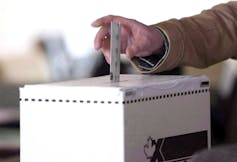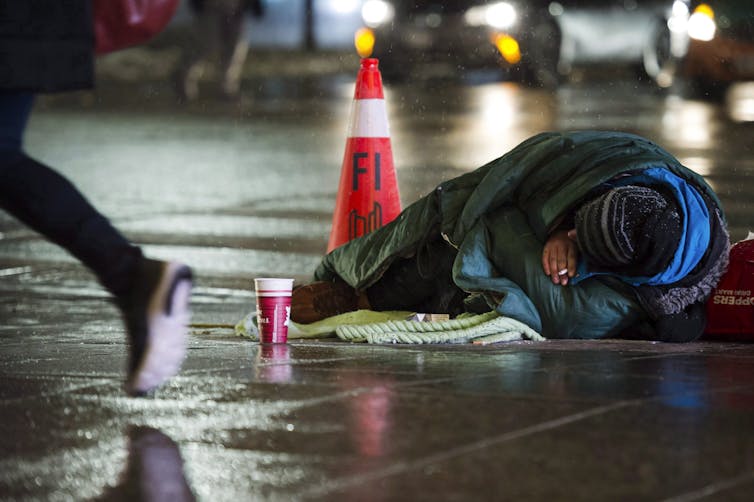In developed nations such as Canada, citizens might assume that governing authorities legitimately and competently act to provide them with economic and social security.
Citizens provide information to government officials on the adverse effects of the inequitable distribution of income and services with the expectation that they will respond. To name just one example, poverty researchers and food security advocates detail the extent of poverty and hunger respectively in Canada and its adverse health effects, hoping for positive policy responses from governing authorities.
Yet growing income inequality among Canadians and the scaling-back of programs that benefit many of them challenge this assumption. Instead, governments are enacting public policies that primarily benefit economic elites. Our research raises serious questions about government legitimacy and competency due to these issues, and how the dereliction has significant impacts on the health and well-being of Canadians.
The legitimacy of governments is based on processes of democracy and participation and the acceptance of public policy outcomes.

No one doubts that Canada holds “free and open” elections. However, the political process is dominated by economic elites whose calls for reduced taxes on corporations and the wealthy, and for scaling back social programs, are enacted by the dominant political parties.
In addition, the “first-past-the-post” electoral systemdisenfranchises the political preferences of a significant number of Canadians — usually the majority of voters — while maintaining control of federal and provincial parliaments by business-oriented political parties.
Weakening the social safety net
Economic elites also dominate political discourse through ownership of the mainstream media, funding of conservative policy institutes and lobbying efforts that weaken the social safety net. And they game the tax system as evidenced by the Panama and Paradise Papers.
What’s the outcome of this domination? Growing corporate power affects labour markets, social spending and tax and transfer policy, all to the detriment of most Canadians.
Indeed, almost 50 per cent of Canadians have indicated they couldn’t meet their financial obligations if their paycheque was a week late.
Poverty rates are revealing
The poverty rate is a good measure of legitimacy. It indicates whether the distribution of resources is so skewed that it creates material deprivation that threatens well-being.
Statistics Canada reports that in 2015 that 14.2 per cent of Canadians — or 4,979,000 people — were living in poverty. Among children 17 years of age and younger, the rate was 15.2 per cent, or 1,032,000 Canadian children. Statistics Canada also reports people in poverty fall a full 30.5 per cent below the poverty line.
This shows that poverty is not only widespread, but deep. Comparatively, Canada ranks 25th of 34 developed wealthy nations in controlling poverty rates.
Another indicator of legitimacy is the extent to which the benefits of an expanding economy are distributed equitably. Over the past 20 years, the incomes of the bottom 60 per cent of Canadians have stagnated, while growing sharply for the highest 20 per cent. Canada ranks 20th among 34 wealthy developed nations in managing income inequality.
A simple definition of competence — “the ability to do something successfully or efficiently” from the Oxford dictionary — can help assess Canada’s governing authorities’ abilities to meet the economic and social needs of citizens.
Despite the Constitution’s commitment to peace, order and good government, Canada has been the subject of an ongoing series of rebukes from the United Nations regarding violations of the civil, political and social rights of its citizens.
United Nations rebukes
Indigenous Rights: The 2014 report of the UN Special Rapporteur on the Rights of Indigenous Peoples identified extreme inequity in socio-economic conditions and well-being between Indigenous and other Canadians. Of the bottom 100 communities in Canada on the Community Well-being Index, 96 are First Nations.
Employment and Working Conditions: Canada has one of the highest rates of low-paid employment among developed nations. Related to this is growing precariousness of work that’s associated with very limited employment benefits, and in particular, job insecurity.

Food Insecurity: Statistics Canada’s Community Health Surveys find that 12.4 per cent of Canadians or 1.1 million households, or more than four million individuals — including 1.15 million children — experience food insecurity. Canada has been scolded by the UN for failing to meet its international obligations to provide Canadians with food.
Housing: At least 200,000 Canadians access homeless emergency services or sleep outsideeach year. A March 2013 Ipsos Reid poll found the number is 1.3 million if it includes people temporarily staying with others, in addition to those sleeping on the streets or in shelters.
In addition, Statistics Canada reports that 12.7 per cent of Canadian households were in what’s known as “core housing need” in 2016.
Core housing need refers to three criteria: Affordability (households spend 30 per cent or more of their incomes on their housing); suitability (the housing is appropriate for household composition and size); and adequacy (the household does not require major repairs, such as plumbing).
The most common reason for core housing need is housing affordability. Canada has been chastised by the United Nations for not meeting its international obligations.

Women’s rights: The United Nations 2016 review found Canada lacked a comprehensive national strategy, policy or action plan to address the structural factors that cause gender inequalities.
It noted the continued high prevalence of gender-based violence against women, in particular against Indigenous women and girls who suffer multiple forms of discrimination in access to employment, housing, education and health care.
What to do?
Canadian governing authorities wear the veneer of legitimacy and competency despite their pandering to economic elites and their unwillingness to fairly distribute resources.
The failure of Canadian governments to respond to these problems requires mobilization of the public to literally force them to act.
Canadian public policy may be creating order, and, currently, peace. It is certainly not good government by any stretch of the imagination.
Author: Dennis Raphael: Professor of Health Policy and Management, York University, Canada, Morris Komakech:PhD Student, York University, Canada, Ryan Torrence: Masters student, York University, Canada and Toba Bryant:Associate Professor of Health Sciences, University of Ontario Institute of Technology
Credit link:https://theconversation.com/we-fail-our-citizens-in-canada-and-the-un-is-onto-us-103894<iframesrc="https://counter.theconversation.com/content/103894/count.gif?distributor=republish-lightbox-advanced" width="1" height="1"></iframe>


